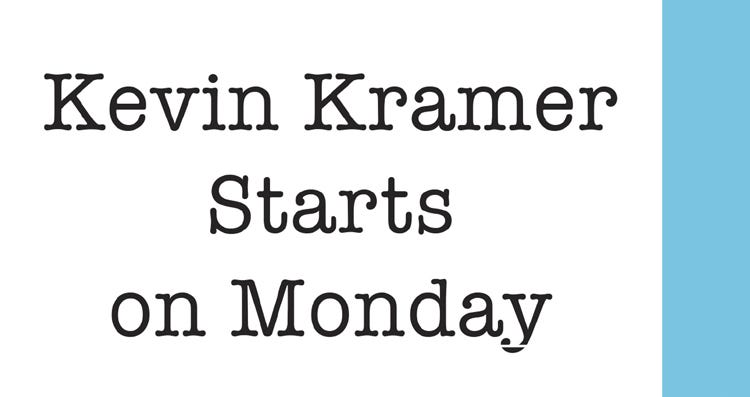interviews
Debbie Graber Proves Why the Office Is as Much a Battleground as It Is a Place of Work
Kevin Kramer Starts on Monday revels in the spare good and the insanity often found office culture

Debbie Graber’s short story collection Kevin Kramer Starts on Monday mines a rich tradition of office-set literature. One might point to such antecedents as Ed Park’s Personal Days or Nicholson Baker’s The Mezzanine, but the roots probably lie all the way back in “Bartleby the Scrivener.” In Herman Melville’s existential tale of the absurdity of bureaucracy, the titular scribe repeatedly refuses to work, offering only the gentle reasoning that he “would prefer not to.” There are more than a few Bartleby-types in Graber’s book, office drones and social losers who, in small but significant ways, push against the idea that their job titles define their identities even as they dutifully show up to work. These include Gregg Fisher, a martyr to mean-spirited company gossip whose disappearance foments his coworkers’ angst; the second-person protagonist of “What do you think is wrong with you?”, a call center representative whose vulgar outburst will probably get him fired; Kyle, a fundamentalist Christian who alternately lusts after and despises his nonbelieving co-worker; and Kevin Kramer himself, a sadistic senior vice president who ruins his own company for no reason other than that he can. Their rebellions, like Bartleby’s, are ultimately self-destructive, demonstrating that alienation is often the price of independence.
There are more than a few Bartleby-types in Graber’s book, office drones and social losers who […] push against the idea that their job titles define their identities even as they dutifully show up to work.
Graber is especially interested the tension between the collective and the individual in the workplace. To that end, a few of the stories are structured around disembodied narrators/protagonists — not quite the first-person plural We but nonetheless suggestive of groupthink. The title character in “Gregg Fisher’s Pontiac Vibe” never actually appears in-scene. Instead, the story relates the escalating gossip that surrounds him, the refrain “Someone said” filling in for co-workers who prefer to remain nameless, e.g. “Someone at the company was seriously afraid that Gregg Fisher was a carrier of the Black Death, and wrote an anonymous note to HR.” It’s the kind of device seen in the work of Stephen Millhauser, but Graber’s application of it to the office setting is innovative and insightful. Our sympathy is with the pariah; Fisher is a tragic character, a scapegoat probably conscious of his status but unwilling or unable to confront his accusers. Similarly, “New Directions” takes the form of a series of unsigned memos from the executives of Production Solutions, a company whose programming staff has apparently vanished rapture-style. The office’s gradual descent into chaos is juxtaposed with the matter-of-fact tone of professional discourse:
Employees:
Some of you may have heard that the clothes the software department members were wearing at the time of their mass disappearance were found in the dumpster near the facilities shed across the street. This is unsubstantiated. No clothes were found in or around the dumpster.
Graber has performed at Second City and the collection’s first-person stories betray that influence, reading like comedic monologues ideal for live performance. She is masterful at crafting a certain loquacious brand of narrator whose desperation for an attentive audience leads to inadvertent confessions.
In “Northanger Abbey,” a Coover-esque piece of metafiction, the narrator describes the novel he intends to write, and it soon becomes apparent that his book is little more than a feeble revenge fantasy. “Back to Me,” a one-sided conversation between the narrator and her psychiatrist, is rife with moments in which the reader is much more aware of what the narrator has let on than the narrator herself; when she says that her self-appointed boyfriend Bret took her on dates to places like “his parking garage or the alley behind Duffy’s” the dramatic irony makes the narrator’s delusion pathetically and hilariously clear. Perhaps Graber’s monologists talk so much to distract themselves from past traumas and transgressions. As they vacillate between neurotic self-absorption and wounded compassion, they call to mind the narrator of another office lit classic, Bob Slocum of Joseph Heller’s Something Happened.
The two best stories are about the least likable characters. “Winners and Losers” features an aspiring screenwriter referred to only as “the winner,” a despicable guy who separates people into the two titular categories. He is pickup artist philosophy incarnate. Throughout most of the story the only thing that demarcates him as a winner is his artificially inflated self-esteem. He’s broke, his family has cut him off, and he spends all the money he has left on a screenwriting class. But the problem, the narrative insists, is us; we don’t see the big picture. “Losers might find it concerning to blow their entire savings on Robert McKee’s Story Seminar at the LAX Embassy Suites, but winners keep their eyes directly on the prize.” But Graber resists an easy ending in which the winner earns his comeuppance or continues to toil in failure the rest of his life. Instead, the winner wins: He gets an agent. He embarks on a lucrative screenwriting career and gets everything he’s ever wanted. And success doesn’t change him; he remains as nasty and self-absorbed as ever. What begins as yet another fictional ethnography of a sad sack loser becomes a refreshingly cynical meditation on the arbitrary nature of success. Likewise, Kevin Kramer is a loser who transforms himself through sheer force of will into a winner. A sociopath in pursuit of power for its own sake, his impressive (though made-up) resume and facility for con jobs has snagged him a senior VP position at Entertainment Solutions. His demanding, can-do demeanor earns him the admiration of the executives even as his erratic approach to management sabotages the company. He fires valuable employees on a whim, is profligate with company funds, alienates peers and clients alike. The only sign of any human tenderness he exhibits is when he browses the internet for “online photos of narwhals, the rare unicorn whales he remembers reading about as a child.”

Kevin Kramer Starts on Monday is at its best in moments like this, when Graber probes the surface impersonality of office culture and reveals it to be the grounds of a unique vulnerability. After all, our co-workers, though we may not know them well and they may be sociopathic bastards, are the people we spend as much time with as our closest loved ones. Insightfully utilizing the tools of the institution itself — business jargon, circular speech, memorandums, emails, gossip, confession — in Graber’s hands the office is a microcosm of life itself.









